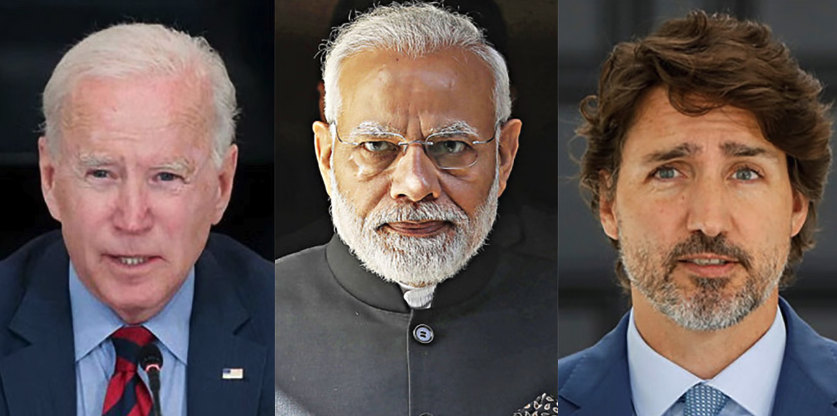Is Biden using Trudeau as a Pawn Against Modi? — Analysis By Former Indian Diplomat
Ex-Diplomat Bhadrakumar raises the question of the United States’ true intentions regarding the allegations against India, suggesting that they might be part of a broader strategy
Former Indian Diplomat Ambassador M.K. Bhadrakumar in his analysis suggests that there may be a hidden agenda at play, with the United States potentially using Trudeau as a pawn to target Indian Prime Minister Narendra Modi.
Trudeau’s allegations against the Modi government come at a crucial juncture, just after the G20 summit, where India successfully prevented any negative references to Russia in the event’s final document.
This diplomatic victory for India coincided with a significant setback for the United States, leading to speculation that these allegations may be a form of retaliation.
Canada’s Role as a Surrogate
The case of Huawei’s Meng Wanzhou, which Bhadrakumar highlights, raises concerns about Canada’s role as a surrogate for the United States.
Meng Wanzhou, the deputy chair of Huawei’s board, was detained in Canada in December 2018 on a provisional U.S. extradition request. She was accused of fraud and conspiracy to commit fraud.
However, subsequent developments in the case have cast doubt on its regularity and raised questions about the motivations behind Meng’s arrest.
In August 2021, the extradition judge expressed “great difficulty in understanding” how the evidence presented by the U.S. government supported its allegations of criminality.
Then, in December 2022, the presiding judge dismissed the charges against Meng following a U.S. request.
These developments have led to speculation about the political nature of the case and whether it was driven by ulterior motives. The dismissal of charges against Meng raises questions about the validity of the initial allegations and suggests that the case may have been flawed or politically motivated.
Former Diplomat’s reference to this case implies that Canada’s willingness to detain Meng on the U.S. extradition request without sufficient evidence may indicate a pattern of acting as a surrogate for U.S. interests.
This raises concerns about Canada’s independence in its foreign policy decisions and its potential role in carrying out the agenda of its larger ally.
The Involvement of Five Eyes
Trudeau’s allegations, as mentioned in the article, reportedly rely on surveillance of Indian diplomats in Canada, with intelligence provided by a “major ally” belonging to the Five Eyes intelligence network.
The Five Eyes alliance comprises Australia, Britain, Canada, New Zealand, and the United States, and it is known for its close intelligence-sharing relationship.
The involvement of the Five Eyes alliance in providing intelligence raises concerns about potential bias and shared interests against India.
The alliance has a history of cooperation in intelligence gathering and sharing, primarily focused on counterterrorism, cybersecurity, and other security-related matters.
While the alliance is built on the principle of trusted collaboration among its members, concerns about potential biases and shared interests are not unfounded.
Critics argue that the intelligence shared between Five Eyes members may reflect their collective perspectives and priorities, which may not always align with the interests of non-member countries such as India.
Support from the United States
The article mentions that Trudeau’s allegations were met with a supportive response from the White House, while the British government, another Five Eyes member, highlighted the close collaboration between Canberra (referring to the Australian government) and Washington regarding evidence of potential Indian involvement in Hardeep Singh Nijjar’s killing.
The White House emphasized the need for a comprehensive investigation and encouraged India to cooperate.
The supportive response from the White House and the collaboration mentioned between Canberra and Washington regarding the evidence could indicate a shared perspective or alignment of interests among these countries.
India’s Reaction and BRICS Membership
According to Bhadrakumar, India’s response to the allegations made by Trudeau has been criticized for its lack of assertiveness. He argues that downgrading India’s representation at the BRICS (Brazil, Russia, India, China, South Africa) foreign ministers’ meeting was a missed opportunity to strategically address the situation.
He emphasizes the significance of India’s BRICS membership, particularly during these extraordinary times.
The downgrade in India’s representation at the BRICS foreign ministers’ meeting, as suggested by Bhadrakumar, implies that India missed an opportunity to use the platform to address the allegations and present its perspective.
BRICS is an important multilateral forum that brings together major emerging economies and provides a platform for dialogue, cooperation, and collective decision-making on global issues.
By downgrading its representation, India may have missed an opportunity to engage with other BRICS members and present its side of the story, potentially influencing their perceptions and gaining support.
Possible Motivations
Ex-Diplomat Bhadrakumar raises the question of the United States’ true intentions regarding the allegations against India, suggesting that they might be part of a broader strategy.
It also mentions Biden’s political career and potential controversies surrounding his presidency, implying that the allegations against India could be a diversionary tactic or an attempt to weaken Prime Minister Modi’s position ahead of India’s general election.
Speculating on the true intentions of a country or its leaders can be challenging, as it often involves analyzing complex geopolitical dynamics and motivations.



